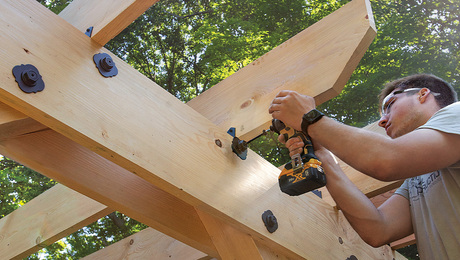My home, located in Indiana, has a basement as well as a crawl space under part of the home. On the north side of the home, there is located four vents for ventilating the crawl space. I have allways kept them open during the summer months but closed them in the winter to conserve heat.
Should these vents remain open all year around to ensure proper ventilation of the crawl space?
I’d like to hear from the experts on this one.
Thank you in advance for all your responses and expert advice.



















Replies
Welcome to Breaktime. I'm in Marion, IN.
"Should these vents remain open all year around to ensure proper ventilation of the crawl space?"
No. They should be closed in the winter.
Why do you ask? You "have always" opened them in summer and closed them in winter.
But now you wonder if that is correct.
What has happened to make you question the procedure?
Rich Beckman
Another day, another tool.
Rich:
Nothing has really changed in the crawl space. During the rainy season, you can detect a musty odor which is coming from the crawl space. I had read an article somewhere in another publication advising that the vents should remain open year around. If indeed that is what is recommended, I thought that this might provide addtional time to vent the crawl space and help reduce the musty odor. But the winter temperatures have me concerned as to exposure to other issues such as cold floors, heat loss, etc. and if there is any real benefit of leaving the vents open.
They were designed, as I'm sure you are well aware of, to open and close. So I can only assume that the vents should be open in the summer and close in the winter.
As allways, there are contrasting opinions, and I elected to post this question to get expert advice.
Thank You
Frank
Current building science is leaning toward closing the vents year 'round. The theory is that it's impossible to dry a cool, damp space by introducing warm, humid air. Think about what happens to the outside of a glass of iced tea on a humid day. Condensation.
The way to go is probably to install a vapor barrier on the floor, and seal the vents permanently with rigid foam.Andy Engel
Senior editor, Fine Woodworking magazine
An updated profile is a happy profile.
Other people can talk about how to expand the destiny of mankind. I just want to talk about how to fix a motorcycle. I think that what I have to say has more lasting value. --Robert M. Pirsig
None of this matters in geological time.
Andy:
Appreciate your advice. I think I'll close them up and see what happens.
Thanks again!
Frank
I wouldn't close them without being sure I had a good vapor barrier down.If the "floor" of the crawlspace is dirt or gravel with no vapor barrier, then you probably have a lot of moisture coming up from there.If you have a musty odor, then you probably have too much humidity. Closing the vents will help if the humidity is coming through them, but if it isn't, then closing the vents might make it worse.Unless a thorough inspection uncovers mold or mildew, your "system" has worked for....a few years?I would start with a good vapor barrier. Six mil plastic would work, but you can get fancy with Tu-Tuff:http://www.energyfederation.org/consumer/default.php/cPath/21_933_68Yes, it is only 4 mil, but it is better.Give yourself some extra so later you can run it up the sides and completely seal the space if you need to.Once the plastic is down, you can close the vents if you want. But if you close vents, keep an eye on it for a year.There is lots of info on crawlspaces athttp://www.buildingscience.com/Rich BeckmanAnother day, another tool.
I have a summer home with a 48" crawlspace, concrete floor. The first summer I left the vents opened. When I ckecked the crawlspace, I honestly thought a pipe had sprung a leak there was so much condensation. Now I leave the vents closed year round, and from May to September I have a dehumidifer set on "2" ( on a scale of 1 to ten). No problems, everything nice and dry, except for the old marks from the black mold that grew that first summer.